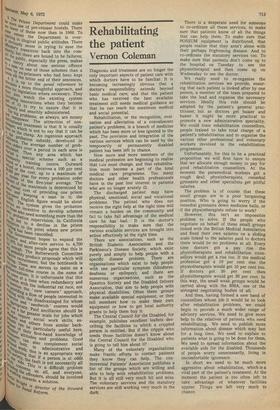Rehabilitating the patient
Vernon Coleman
Diagnosis and treatment are no longer the only important aspects of patient care with which doctors have to be familiar. It is becoming increasingly obvious that a doctor's responsibility extends beyond basic medical care; and that the patient who has received the best available treatment still needs medical guidance so that he can reach• his maximum medical and social potential. Rehabilitation, or the recognition, evaluation and alleviation of a convalescent patient's problems, is a branch of medicine which has been more or less ignored in the past. The provision and integration of the various services which can be used by the temporarily or permanently disabled patient has been left to chance. Now more and more members of the medical profession are beginning to realise that teis must change, and that rehabilitation must become a part of the total medical care programme. Too many doctors and other health professionals have in the past lost interest in patients who are no longer acutely ill. The discharged patient may have physical, emotional, social and vocational problems. The patient who does not receive the right help at the right time will remain a burden on the community and fail to take full advantage of the medical care he has had. It is the doctor's responsibility to make sure that the various available services are brought into action effectively at the right time. There are associations, such as the British Diabetic Association and the Parkinson's Disease Society, which exist purely and simply to help people with a specific disease problem. There are organisations which exist to help people with one particular symptom (blindness, deafness or epilepsy); and there are numerous organisations, such as the Spastics Society and the Disabled Drivers Association, that aim to help people with physical disabilities. Often these groups make available special equipment, or they tell members how to make their own equipment or how to get local authority grants to help them buy it. The Central Council for the Disabled, for example, publishes excellent leaflets describing the facilities to which a crippled person is entitled./ But if the cripple who needs those facilities doesn't know about the Central Council for the Disabled who is going to tell him about it? Many of the voluntary organisations make frantic efforts to contact patients they know they can help. The con troversial Patients' Association publishes a list of the groups which are willing and
able to help with rehabilitation problems. But it is all still very much hit and miss. The voluntary services and the statutory services are still working very much in the
dark. There is a desperate need for someone to co-ordinate all these services, to make sure that patients know of all the things that can help them. To make sure that POSSUM equipment is distributed, that people realise that they aren't alone with their perhaps frightening disease. And to co-ordinate the statutory services too. To make sure that patients don't come up to the hospital on Tuesday to see the physiotherapist and then come up on Wednesday to see the doctor.
We really need to re-organise the rehabilitation services we provide, ensuring that each patient is looked after by one person, a member of the team prepared to take the lead and organise the necessary services. Ideally this role should be adopted by the patient's general practitioner, but as doctors get busier and busier it might be more practical to promote a new administrative speciality. We could train rehabilitation counsellors, people trained to take total charge of a patient's rehabilitation and to organise the various other professional and voluntary workers involved in the rehabilitation programme.
Unfortunately, for this to be a practical proposition we will first have to ensure that we allocate enough money to pay for good rehabilitation counsellors. At the moment the paramedical workers get a rough deal; physiotherapists, remedial gymnasts and other specialists get pitiful salaries.
The problem is of course that these small groups are in a poor bargaining position. Who is going to worry if the remedial gymnasts down medicine balls, or if the physiotherapists refuse to work?
However, this isn't an impossible problem to solve. If the people who negotiate on behalf of these small groups linked with the British Medical Association and fixed their own salaries on a sliding scale linked to the salaries paid to doctors there would be no problems at all. Every time doctors got a pay rise the physiotherapists and rehabilitation counsellors would get a rise too. If the medical profession got a 10 per cent rise the physiotherapists would get 10 per cent too. If doctors got 30 per cent then physiotherapists would get 30 per cent. In this way, the small weak groups would be carried along with the BMA, one of the strongest negotiating bodies of all.
And then, having formed a new band of counsellors whose job it would be to look after rehabilitation problems, we could begin to provide a much wider range of advisory services. We need to give more help to the relatives of patients who need rehabilitating. We need to publish more information about disease which may last for a long time. We need to explain to patients what is going to be done for them, We need to spread information about the available aids for the disabled. Thousands of people worry unnecessarily, living in uncomfortable ignorance.
In short we need to be much more aggressive about rehabilitation, which is a vital part of the patient's treatment. At the moment the patient is too often left to take advantage of whatever facilities appear. Things are left very much to chance.










































 Previous page
Previous page